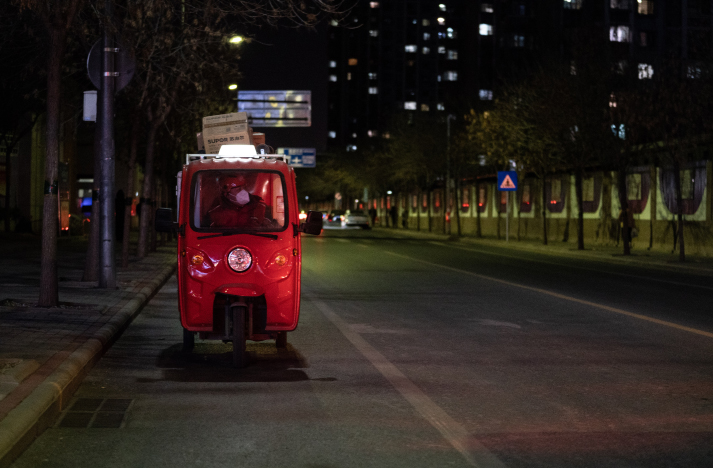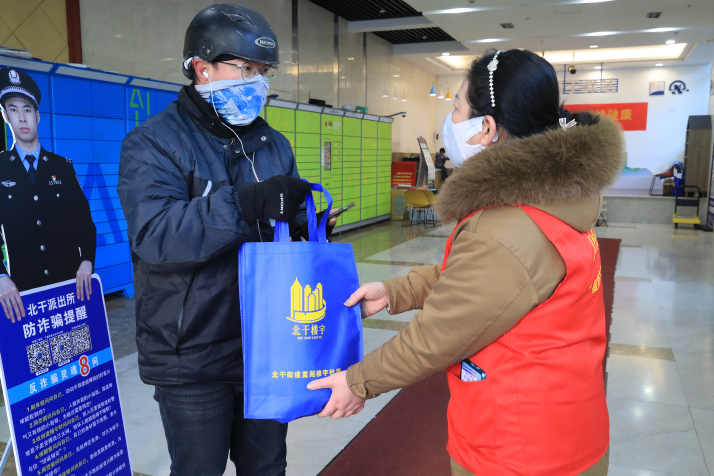| China |
| Following China's optimized COVID-19 response, delivery services race to a new peak | |
|
|
 A courier on a late night delivery run in Beijing on December 15 (XINHUA)
Before the crack of dawn, at 6 a.m., express delivery stations across Beijing gear up for another busy day in the stinging cold of winter. Liu Chao, a deliveryman with ZTO Express, one of China's major courier companies, usually starts his workday by sorting, disinfecting and loading parcels into his vehicle with the help of his colleagues. As winter is a peak season, Liu can deliver hundreds of items per day. Some of them are light ones like a pair of gloves or medicine, while others, such as big boxes of mineral water, can prove a real weightlifting exercise. Having worked in the same position for almost six years, Liu is an old hand at the job, but the most recent surge in orders has left him a bit overwhelmed. "Sometimes my deliveries arrived later than the deadline stipulated on our company's app, which is usually two to three days after the buyer places his or her order, but most customers showed understanding and appreciation. I'm very thankful for that," he told Beijing Review. Liu is one of some 4.5 million people active in China's express delivery industry. These men and women have been busy as the country's courier sector witnesses an accelerated recovery, with average daily business volume on a steady rise since late November and headed for a new peak, the State Post Bureau (SPB) said in early December. Slower but still running SPB data showed that in 2021, the number of express packages delivered across China exceeded 108.3 billion, increasing more than 20 times in 10 years and accounting for more than half of the world's total. The number of express delivery workers in China also soared from only 542,000 in 2010 to nearly 4.5 million in 2021. Plus, with the rapid development of e-commerce platforms, more farm produce from China's remote rural areas is now being delivered nationwide, leading to an expansion of the courier market in many regions, Xu Liangfeng, an official with the bureau's department of data administration, said. On December 1, this year's parcel volume of China's delivery sector exceeded 100 billion, seven days earlier than in 2021, according to the SPB. The growth is partly attributed to the country's optimized COVID-19 response and an effort to boost consumption. Following 20 adjustments announced in November, on December 7, China's central authorities issued 10 new measures easing pandemic restrictions on social and economic activities and gradually bringing people's life and businesses back to normal. The new measures range from allowing home quarantine for mild and asymptomatic cases to reducing the need for mandatory nucleic acid testing to make it easier for people to enter public venues and travel between regions. Annual online shopping bonanzas such as Double 11 and Double 12, which took place in November and December, respectively, also played a part in the surge in deliveries. Although seemingly a bit quieter than in previous years, due to some buyers cutting their expenditures and resorting to somewhat thriftier lifestyles, as well as sales deals simply not tempting enough to spark consumer frenzy, statistics showed delivery businesses in these periods were still very much alive and kicking. The SPB said express delivery firms nationwide handled 4.27 billion parcels, mostly sent by e-commerce vendors to shoppers, from November 1 to 11. On November 11 alone, parcel volume hit 552 million, 1.8 times the daily average. Some 4.3 billion parcels were collected in China from December 1 to 12, up 5.6 percent year on year. To the rescue Meanwhile, the country's soaring COVID-19 infections since early December plus people being generally less active in winter have been other reasons for the rising demand for delivery services. Gu Huiyi, manager of a ZTO Express station in Xining, Qinghai Province, where temperatures can plummet to minus 20 degrees Celsius, said some employees had gotten sick either from COVID-19 or the cold, leading to staff shortages. "Even though we have higher salaries now [because it's both winter season and there's a staff shortage], the demand for delivery people still surpasses supply," Gu said. Fortunately, the local government helped the company recruit some part-time workers from nearby villages, easing peak season pressures. Similarly, many cities in short supply of couriers have received help. The logistics branch of China's leading e-commerce platform JD.com encouraged its employees from different regions to voluntarily go to the country's capital to help resolve its delivery woes, with more than 1,000 delivery people arriving in Beijing in mid-December. "One thing that touched me was when an old lady here [in Beijing] offered me a bowl of noodles when she'd received her parcels. I was very moved," Li Haijiao from Bayannur in Inner Mongolia Autonomous Region told China News Service. And many similar heartwarming stories continue to emerge during this special time. On social media, like China's Twitter equivalent Weibo, netizens have initiated a campaign that calls for more understanding and empathy for delivery workers. "Please don't rush them, wait a bit longer, be less harsh and more tolerant." This slogan received wide public support.  A volunteer presents a courier (left) with a COVID-19 prevention kit in Hangzhou, Zhejiang Province, on December 20 (VISUAL PEOPLE)
Couriers, too, have rights Couriers in work are also receiving services from governments, companies and other agencies. For example, the Urumqi Branch of China Post Group in Urumqi, capital of Xinjiang Uygur Autonomous Region, has set up lounges at its outlets citywide for delivery people to take a short break. These lounge areas feature books, microwaves, chargers, hot water and medicine. The post branch plans to further collaborate with shopping malls, office buildings and residential neighborhoods to establish more similar lounges. Authorities in Qinghai, including the departments of transport and postal administration, in late 2021 executed plans to better protect the rights of couriers, such as higher salaries and social security, helping them get professional training and urging companies to protect their rights as employees, including well-deserved time off. In October, Dongguan City in Guangdong Province hosted a vocational skills competition for couriers, offering them a platform to exchange ideas and shine. The competition was divided into two parts: a theoretical examination and a demonstration of their skills. Specific events included fragile product packaging, inspections of prohibited and restricted articles, and the operation of hi-tech express systems. Winners received honorary titles with official recognition. Since the outbreak of COVID-19 in early 2020, China's delivery workers have more than once served as lifelines for residents unable to leave their homes due to lockdowns or illness, often putting their own physical and mental wellbeing on the line. With grueling schedules, these men and women have raced against the clock. And for that, they deserve the nation's applause and respect. (Print Edition Title: On the Road) Copyedited by Elsbeth van Paridon Comments to luyan@cicgamericas.com |
|
||||||||||||||||||||||||||||||
|
